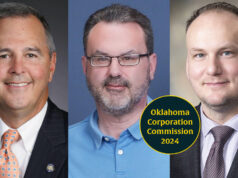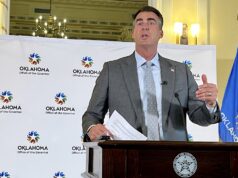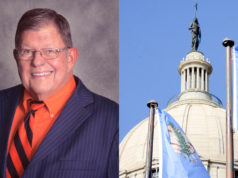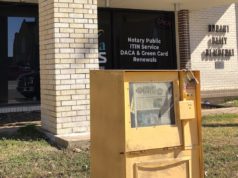
You’ve seen the headlines and social media reactions swirling the Internet. The Oklahoma Legislature is a “train wreck.” It’s time to “panic.”
Legislative leaders have been enjoying backstage tickets to American Ninja Warrior as opposed to passing a teacher-pay raise, and a greatly hyped cigarette tax failed after a much-discussed Medicaid rebalancing plan was pulled at the last minute. Meanwhile, legislative leaders brought outrageous abortion bills and bathroom regulation proposals to the table.
Social media blew up as a result, with many Republicans scrubbing their hands to the bone of such foolishness and many Democrats playing martyr with insufferable memes. It was, in some sense, the logical conclusion of an illogical session.
“The sky is falling! We’re all doomed! It’s the Legislature’s fault!”
But Thursday evening in Tulsa, the public discussion of Oklahoma legislative activities reached a vexing low when Senate President Pro Tem Brian Bingman (R-Sapulpa) briefly opened his mouth and let all his pent-up stupid flop out.
Bingman told the Tulsa World that media are to blame for the growing public perception that the Legislature is focused on divisive social issues instead of core government services like education, health care and infrastructure.
“That’s the media’s doing,” said Bingman, R-Sapulpa. “They can pick and choose and they can elevate the issue and people call and (say), ‘Is that really what you all are doing?’ My focus has been on the budget this year.”
Bingman’s shoddy deployment of “blame the press” messaging embodies the desperation and frustration that often defines politicians who leave office in some form of disgrace.
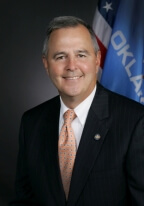
While Bingman seems to have paid all his taxes and not accepted bribes — unlike his two Pro Tem predecessors — his tenure as leader of the Legislature’s upper chamber may well be remembered for allegiance to the oil and gas industry, a lack of forward-thinking leadership and an embarrassing complacency that has enabled an education crisis, a health care crisis and the state’s overarching revenue issues.
For Bingman to point fingers at media when less than a week’s worth of legislative working days remain and no budget agreement has been announced is akin to a doctor committing medical malpractice before saying, “Well, the patient shouldn’t have been sick in the first place.”
It’s laughable, and it’s also a tangible example of just how poorly the Senate leader has spoken to the public (and media) about the challenges Oklahoma faces. In addition, it’s horribly ironic.
A review of press releases from Bingman’s office yields only one released last week with his name attached. It came on Friday at 5:14 p.m., and it addressed one of the topics the senator said media unfairly “elevate.” The release explained his support for SB 1619, which focuses on transgender bathroom restrictions at Oklahoma public schools.
So in summary, Bingman stood piously Thursday night and blamed media for focusing attention on bills like SB 1619. Less than 24 hours later, his office sent reporters his only press release of the week extolling the reasons he supports the very same bill.
While the Senate leader’s job and actions are far more complicated and difficult than most people will ever understand, blaming media for covering what they see — and what he sends them press releases about — has been Bingman’s most off-message moment to date.
The next five days will mark the final chapter in Brian Bingman’s Senate legacy, and this week’s looming budget agreement will be largely his to own, for good or bad. As a professional narrative salesman, he is welcome to shill his brand of soap to the public with whatever wrapper he wants to put on it.
But media are under no obligation to ignore what it smells like.
Things we saw (and heard)
When the oil boom went bust, Oklahoma protected drillers and squeezed schools — Reuters.com
Conservative congressional candidate share screenshot, forgets to close porn windows — DailyKos.com
Historic budget cuts bring lots of “lasts” on last day of Tulsa schools — Tulsa World
American Energy Partners to shut down — Wall Street Journal
Washington Post poll shows Native Americans unbothered by Redskins name — ESPN.com
Quotes to note
A 25 percent cut to Medicaid would not put my hospital in jeopardy, because we are already in jeopardy. A 25 percent cut would shutter our doors for good, leaving 33,000 people without access to health care.
— McCurtain Memorial Hospital CEO Jahni Tapley in an Associated Press story about support for Oklahoma Medicaid expansion in the face of ongoing provider cuts, 4/28/16
Why are we looking at wind? Because that’s where we’re being told to look. Who is telling us to look there? The Windfall Coalition. Who is running that? Harold Hamm. The greed of oil and gas in Oklahoma and the ineptitude of politicians is like nothing you’ve seen.
— Cory Williams (D-Stillwater), on the oil industry’s wind-power lobbying, 5/20/16
This investigation has revealed that most Department employees profoundly misunderstood the Protocol. Although some … were able to intelligently testify regarding the Protocol, the majority simply could not.










